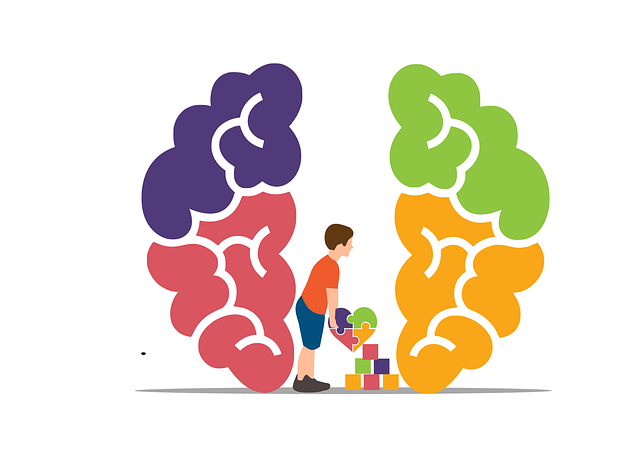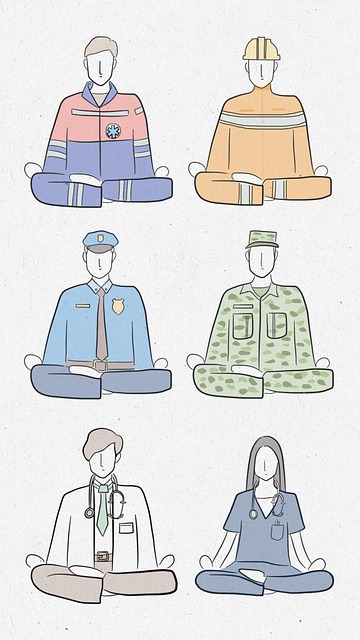In today's diverse healthcare landscape, particularly in Highlands Ranch, cultural competency is essential for delivering quality care. Training in cultural sensitivity, such as that offered by Highlands Ranch Dialectical Behavioral Therapy (HRDBT), equips providers to understand and appreciate unique cultural perspectives and needs. This tailored approach enhances communication, builds trust, and offers trauma-informed care, addressing marginalized communities' unmet needs and promoting health equity. HRDBT's interactive workshops and sessions foster personal growth and resilience by integrating cultural beliefs with DBT principles. Comprehensive evaluation methods, including pre/post assessments, patient feedback, and long-term tracking, ensure the success of HRDBT in providing effective, culturally sensitive therapy.
“In today’s diverse healthcare landscape, cultural competency among providers is no longer an option but a necessity. This comprehensive guide explores the critical role cultural sensitivity plays in modern therapy practices, focusing on Highlands Ranch Dialectical Behavioral Therapy (DBT) as a framework. We delve into the far-reaching impacts of unaddressed cultural differences and present effective training strategies for healthcare providers to enhance cross-cultural communication. Additionally, we discuss evaluating program success through measuring the effectiveness of cultural competency initiatives in DBT.”
- Understanding Cultural Competency in Healthcare: A Necessity in Modern Practice
- The Impact of Unaddressed Cultural Differences on Therapy Outcomes
- Highlands Ranch Dialectical Behavioral Therapy (DBT): Incorporating Cultural Sensitivity
- Training Strategies for Healthcare Providers to Enhance Cross-Cultural Communication
- Measuring Success: Evaluating the Effectiveness of Cultural Competency Programs in DBT
Understanding Cultural Competency in Healthcare: A Necessity in Modern Practice

In today’s diverse healthcare landscape, cultural competency is no longer a nice-to-have but an absolute necessity. Understanding and respecting cultural differences among patients is essential for providing quality care, especially in communities like Highlands Ranch where a mix of backgrounds and beliefs coexists. This concept goes beyond mere tolerance; it involves actively recognizing and appreciating the unique perspectives and needs of individuals from various ethnic, racial, religious, and socio-economic groups. For instance, Dialectical Behavioral Therapy (DBT), a therapy model gaining traction in trauma support services, is highly sensitive to cultural nuances. It recognizes that stress management and stress reduction methods must be tailored to an individual’s background, ensuring their effectiveness and accessibility.
By integrating cultural competency training, healthcare providers in Highlands Ranch can better navigate complex patient interactions. They become more adept at communicating effectively, building trust, and offering trauma-informed care. This is crucial for addressing the unmet needs of marginalized communities and promoting health equity. For example, understanding a patient’s cultural context may help a provider interpret their symptoms or preferences differently, leading to improved treatment outcomes. Moreover, such training empowers providers to challenge their own biases, ensuring that every patient receives personalized, compassionate care.
The Impact of Unaddressed Cultural Differences on Therapy Outcomes

Unaddressed cultural differences can significantly impact therapy outcomes, especially in regions like Highlands Ranch where diverse communities coexist. When therapists fail to recognize and respect clients’ cultural backgrounds, it creates a barrier to effective treatment. For instance, dialectical behavioral therapy (DBT), a popular approach, might not resonate with individuals from different ethnic or socioeconomic backgrounds without tailored modifications.
Cultural competency training equips healthcare providers in Highlands Ranch with the skills to navigate these complexities. Through public awareness campaigns and compassion cultivation practices, therapists can enhance their self-awareness exercises, enabling them to adapt treatment methods sensitively. This approach fosters a more inclusive therapeutic environment, ensuring that DBT or any other modality is accessible and beneficial for all clients, regardless of their unique cultural nuances.
Highlands Ranch Dialectical Behavioral Therapy (DBT): Incorporating Cultural Sensitivity

Highlands Ranch Dialectical Behavioral Therapy (DBT) stands as a beacon of hope for individuals seeking to enhance their mental wellness and cultivate inner strength. This therapeutic approach is renowned for its effectiveness in treating complex emotional disorders, but what sets it apart is its unwavering commitment to cultural sensitivity. By incorporating elements of cultural competency, DBT becomes even more impactful, ensuring that every client receives care tailored to their unique background and experiences.
The program delves into the profound connection between culture and mental health, recognizing that people from diverse backgrounds may have varying perceptions of emotional distress and coping mechanisms. Through interactive workshops and individual therapy sessions, clients explore the interplay of cultural beliefs, values, and practices with the core Mind Over Matter principles of DBT. This holistic approach not only facilitates personal growth but also empowers individuals to navigate life’s challenges with greater resilience, fostering a deeper sense of self-awareness and connection to their inner strength.
Training Strategies for Healthcare Providers to Enhance Cross-Cultural Communication

Healthcare provider training should focus on interactive and engaging strategies to enhance cross-cultural communication. Role-playing scenarios, where providers act out patient interactions with diverse cultural backgrounds, can significantly improve their ability to navigate sensitive conversations. These simulations allow professionals to practice active listening, empathy, and adaptation to different dialects and communication styles, such as those learned in Highlands Ranch Dialectical Behavioral Therapy. By immersing themselves in these realistic scenarios, providers gain confidence in managing diverse patient populations.
Additionally, workshops on cultural sensitivity, including topics like depression prevention, conflict resolution techniques, and mental illness stigma reduction efforts, can provide valuable insights. These sessions offer a deeper understanding of various cultural perspectives, encouraging professionals to reflect on their own biases and adapt their practices accordingly. Incorporating such training into healthcare curricula ensures that providers are equipped to deliver culturally competent care, fostering better patient-provider relationships and improving overall healthcare outcomes.
Measuring Success: Evaluating the Effectiveness of Cultural Competency Programs in DBT

Measuring success in healthcare provider cultural competency training, such as those offered through Highlands Ranch Dialectical Behavioral Therapy (DBT), involves rigorous evaluation to ensure the effectiveness of programs. This process includes assessing both the knowledge and skills acquired by participants. Pre- and post-training assessments are crucial tools to gauge growth in self-awareness exercises, inner strength development, and proficiency in applying cultural competence principles in real-world scenarios.
The evaluation should also consider the impact on patient care outcomes, including improvements in communication and relationship building with diverse patient populations. Additionally, tracking long-term changes in providers’ attitudes and behaviors related to cultural sensitivity, as well as incorporating feedback from participants, can provide valuable insights into the program’s strength and areas for enhancement. This holistic approach ensures that the Highlands Ranch DBT therapy programs not only meet but exceed expectations for developing a robust self-care routine for better mental health within the healthcare provider community.
Cultural competency training is no longer a nice-to-have, but an indispensable component of modern healthcare. As highlighted by our exploration of Highlands Ranch Dialectical Behavioral Therapy (DBT) and its focus on cultural sensitivity, addressing cultural differences in therapy significantly improves patient outcomes. Effective training strategies empower healthcare providers to enhance cross-cultural communication, fostering inclusive environments that benefit diverse patient populations. Measuring the success of these programs ensures their continuous improvement, ultimately revolutionizing mental health care for all.








